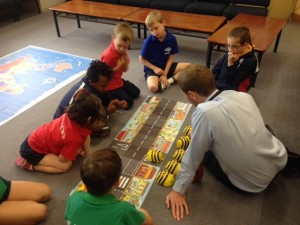Category Archives: 21st century learning
Maps, Programming and Literacy Rotations
Year 2 have been looking at maps and understanding directions and procedural language for their Unit of Inquiry.
Today, some students put this knowledge into practice using the Beebots and the maps we have purchased.
Programming with Apps – Prezi and Thinglink
The links and support resources for teaching Programming with Apps for Teachers and Students.
More resources can be found at EdOffICT Programming page.
<
This prezi is under construction – just an upload of PDF’s at the moment. Will be adding to it soon.
The below thinglink has the links to the apps used in the session and some additional resources.
Telling our stories
Year 1 have been inquirying into stories and storytellling.
The central idea is:
People use a variety of stories for different purposes.
Some of the students have written wonderful stories that we have ‘published’ using apps.
So far we have experimented with the following apps
- MyStory
- StoryKit
- PixnTell
See below for some examples for the stories.
StoryKit – click on the audio icon to hear the students reading their story aloud.
Click here for a StoryKit tutorial.
My Story – Book Maker for Kids
PixnTell
The Pixn Tell app allows you to design your story and then publish it. Once published it is created into an audio file (MP4).
There are so many fantastic tools for creating digital stories.
Some of my other resources about teaching this can be found at my diggo digital storytelling links and Online Stories page at my JSSALC wikispaces.
Kids of today – infographic
Exploring the potential of Flipped Learning
The term Flipped Classroom has been a buzz word in education circles for a few years.
The potential for improving classroom practice and engagement is partly why there are many innovative teachers adopting these methods into their classroom practice.
See the links to resources to support your exploration.There are many examples of this being done successfully (with documentation of these journeys).
JSSALC diggo links Flipped Learning
Twitter hashtags #flippedclassroom and #flippedclass
21stedtech has an excellent collection of resources (research and practical examples).
Additionally, an infographic (for those who learn visually) explains the concept and impact succinctly. The statistics on improved student learning are mind blowing.
Source
http://www.knewton.com/flipped-classroom/

Created by Knewton and Column Five Media
If you would like to try this with your class please let me know. Happy to support.
Ideas for action – wallwisher
Using a wallwisher is a great way to quickly gather feedback and ideas.
This wallwisher was created from a conference (ACEC2012) using twitter. A nice addition to wallwisher is a QR code is generated for the wall. Another simple use of QR codes.
http://wallwisher.com/wall/Ideas4Action
DIGITAL LEARNING DAY CHALLENGE: How are you changing your teaching and learning?
Digital Learning Day is coming soon- 6th February 2013.
See the Digital learning facebook page.
Digital learning is also known as e-learning. One example of e-learning is flipped classrooms. This can take a variety of formats. Please ask me if you would like support with this.
Currently, I am a participant in a MOOC (Massive Open Online Course) E-Learning and Digital Culture. It is a coursera course – online courses run by various universities around the world (and it is free!).
This is the twitter feed.
ARE YOU GOING TO TAKE THE E-LEARNING CHALLENGE?
Great reading: Flip your classroom
See the website below for some resources to help you. “The Alliance develops toolkits to provide digital learning resources and ideas for teachers in specific subject areas. The tools and resources in these toolkits are not the totality of good information available; instead, they are designed to provide guidance on how technology and digital learning can enhance the educational experience and outcomes for all students. We continue to add to this collection and welcome any ideas, tools, models, or resources. Learn & Explore with these incredible toolkits!”
Source http://www.digitallearningday.org/take-action/ Other resources
See more about flipping the classroom at
Another valuable resource for Australian educators is The National Digital Learning Resources Network (Education Services Australia) http://www.ndlrn.edu.au/default.asp
Take the challenge, improve your learning, reach your students and have FUN!
SEARCH with QR codes – WELCOME TO 2013 JS LIBRARY!
WELCOME TO 2013 – SEARCH -ASK – LEARN -CONNECT
BEGINNINGS … We SEARCH…
This year for my orientation to use of the PYP library we are going to use some QR codes. I will have a scavenger hunt for students to orientate themselves but I am also looking for some higher order and creative thinking to be employed.
We will look at what a contemporary library is using the Y chart as a stimulus (looks like, sounds like, feels like) and consider how this is different from the library of the past using the PYP ATTITUDES and PYP LEARNER PROFILE as support materials.
Teachers and students will have a chance to look at the PYP library using the QR CODE.
See the following links for more information.
http://jssalclibrary.wikispaces.com/HOW+TO+USE+THE+LIBRARY
http://www.diigo.com/user/jssalc/QR_codes
http://jssalc.wikispaces.com/Augmented+Reality
See the link below for a great example of QR codes being used in a Specialist class (PE).
http://www.thephysicaleducator.com/resources/skill-posters/
Finally, this glogster is an excellent introduction to QR codes in education.
Enjoy!
Ipad recommendations with list.ly
A great way to share resources – use a list.ly list.
This one is for ipad recommendations.






